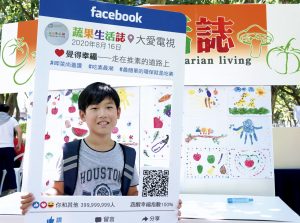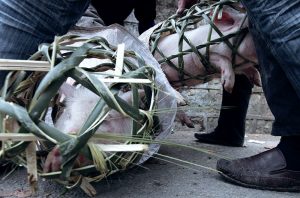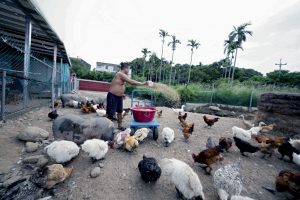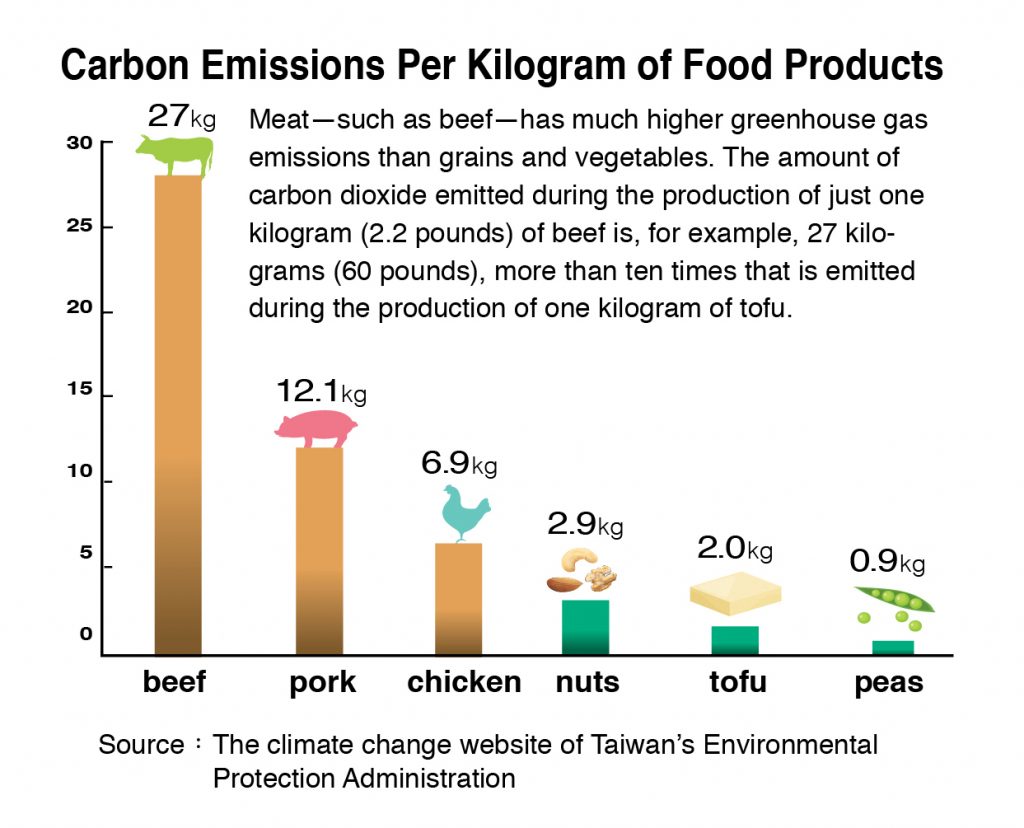Food for Thought: the Power of Vegetarianism
By Chen Li-an (陳麗安)
Photos by Michael Xiao (蕭耀華)
Compiled and translated by Wu Hsiao-ting (吳曉婷)
Food for Thought: the Power of Vegetarianism
By Chen Li-an (陳麗安)
Photos by Michael Xiao (蕭耀華)
Compiled and translated by
Wu Hsiao-ting (吳曉婷)

Park Shu-min talks to a camera about her dining experience in a vegetarian restaurant. She was creating a video to post online to encourage more people to give vegetarianism a try.
“Hello, everyone, I’m Shu-min,” said Park Shu-min as she looked into the camera. “Today I’m going to demonstrate how to make spicy fried rice cake.” The 24-year-old South Korean, who went to school for many years in Taiwan and now lives and works on the island, was creating a video to post on a social media platform. She has posted more than 15 videos online since the start of this year. The common themes of her videos are environmental protection and vegetarianism. She’s been a vegetarian for nine years now.
“I create my videos mainly to inspire people to quit eating meat,” the young woman said. She added that she switched to a vegetarian diet after watching a documentary when she was a student. That documentary, titled Cries of Life, was about the miserable lives of factory-farmed animals, such as pigs and chickens. She was greatly shocked by what she saw in the film. It made her realize how much suffering such animals endured on farms and during slaughter, just so people could have meat to eat. “I like animals and children very much,” Park said. “I found it very cruel that some animals were forcibly separated from their families, couldn’t grow and live normally, and were then mercilessly slaughtered to satisfy people’s appetites for meat.” The documentary forced her to reflect on her own diet. When she realized that she could live well without eating meat, she decided to go vegetarian.
Park admits there aren’t many vegetarian restaurants in Korea. That poses a challenge when she goes back to her home country and eats out with friends. People there also don’t know much about vegetarianism. A friend once said to her, “You’re a vegetarian? Let’s go eat pork knuckles then.” That friend thought that pork knuckles didn’t count as meat.
“I’ve also had friends put meat on my plate and tell me to pretend that it was vegetarian meat,” Park said. “I felt so disrespected!” The inconvenience, mockery from friends, and her love for tempura once made her waver on her decision of becoming a vegetarian, but her love for animals eventually won out and she has stuck with her choice.

A child participates in a game in an event held by the Tzu Chi Foundation and Taipei city government in August 2020 to encourage vegetarianism.
Limited food choices and worries about being “ostracized” by non-vegetarian friends have caused many novice vegetarians to abandon their decision and go back to eating meat. Park admits that it is a challenge for vegetarians to balance their diet choices with social life. She knows that she can’t force her friends to accommodate her diet choice, so she tries to be as flexible as possible—up to a point. “When left with no other choice, I share meat dishes with friends by eating only the vegetables in the dishes. My core principle is ‘no meat.’”
Park started sharing vegetarian cooking and food on social media when she was a student and kept it up after she started working. She plans her videos with care. What matters to her most is not the number of likes she gets, but how well she can encourage more people to reflect on what they eat. One thing she hopes to get people to think about is the impact their diet choices have on the environment.
“I didn’t realize until I became a vegetarian that livestock agriculture requires huge amounts of water and pollutes the earth and the air,” Park said. Once she learned that eating vegetarian is not just a way for her to show her love for animals but also a great way to protect the environment, she decided to start doing more for the environment. For example, she started carrying reusable tableware when she goes out so that she can avoid using disposable items.
She finds it very heartening when people who have watched her videos tell her they’ve become interested in a vegetarian and eco-friendly lifestyle because of her and have even decided to give vegetarianism a try. “Feedback like that always comes as a great encouragement,” Park said with gratitude. “I’ll keep promoting vegetarianism in my way even if I have an audience of only one person.”
The Vegan Fad
Vegetarianism used to be more associated with religion, but more and more younger people now are opting to go vegan for the environment, for health, and for animal rights. Park cites herself as an example—her decision to become a vegetarian was prompted by her desire to protect animals. Even though her parents had long ago switched to a vegetarian diet due to their religious beliefs, they never demanded that Park follow suit. Instead, they respected her choices. “Young people don’t like to be forced into doing things,” she said. “If my parents had tried to coerce me to quit eating meat, it would very likely have had the exact opposite effect.” Since it was her own decision to eat vegetarian, she’s been more willing to stick to the path she has chosen.

According to the Food and Agriculture Organization of the United Nations, more than 77 billion livestock animals around the world were killed for meat production in 2018. That number translates into the slaughter of 210 million animals per day, 2,443 animals per second. Those statistics do not include marine life.
Because vegetarianism is close to her heart, Park has tried to stay up-to-date on issues related to it. She shares that the term “vegan”—meaning no consumption or use of animal products—has become popular among the younger generation in recent years, mainly due to the influence of celebrities in politics, business, sports, and show business. “The dietary habits of young people are easily shaped by people around them or the celebrities they like,” Park said. “The fad of veganism has undoubtedly led more people to want to learn more about a plant-based diet.” She hopes that such a trend will help raise awareness of the deeper meaning of a vegetarian diet: respect for animal rights and love for the Earth.
In recent years, companies producing plant-based meat substitutes, such as Beyond Meat, OmniFoods, and Impossible Foods, have become rising stars in the food industry and stock market. The meat substitutes developed by these companies have garnered a lot of attention from both vegetarians and non-vegetarians. In fact, The Economist declared 2019 the “Year of the Vegan” because interest “in a way of life in which people eschew not just meat and leather, but all animal products including eggs, wool and silk, is soaring, especially among millennials.”
Taiwan, with a population of more than 23 million people, has more than three million vegetarians. Compared with people in many other countries, the island’s inhabitants are more informed about and receptive to vegetarianism. It is also not difficult to find restaurants serving vegetarian food in Taiwan. Taipei, in northern Taiwan, has been listed by CNN as one of the top ten cities in the world for vegans.

Some younger Tzu Chi staffers in Taiwan have started a live stream program to promote a vegetarian diet.
Even so, a considerable amount of meat is still consumed in Taiwan. According to 2018 statistics from Taiwan’s Council of Agriculture, people in Taiwan eat an annual average of 70 kilograms (154 pounds) of pork and poultry per person, far higher than that consumed in Japan, the Philippines, and other nearby countries. In view of worsening climate conditions and the coronavirus pandemic, which was suspected to have been caused by wild animals, the Tzu Chi Foundation, based in Taiwan, has stepped up its efforts to promote vegetarianism. Some younger Tzu Chi staffers in Taiwan have, for example, started a live stream program to campaign for a vegetarian diet. Volunteers in other countries have been doing what they can to advocate for vegetarianism too. Tzu Chi USA has launched a campaign which has successfully encouraged participants to eat more than two million vegetarian meals.
Whether as a result of the vegan fad or due to people’s conscious efforts to protect the environment and animal rights, vegetarianism is a lifestyle choice many people are making for themselves around the world.
Save the Earth with Your Diet
Business is booming at a restaurant on a street next to Da’an Forest Park in Taipei. People lining up to eat there before the shop even opens is a common sight on weekends and holidays. The bright, neat, comfortable environment in the restaurant and a menu offering a rich variety of vegetarian cuisine have drawn a wide clientele ranging from older people, mothers with children, and young office workers.
Liu Yan-xi (劉妍希) is the owner of the restaurant. Like Park, she’s relatively young, only 28. Environmental protection is an issue that Liu follows closely, and it was her concern for the environment that led her to open the restaurant, which she did three years ago to motivate more people to eat less meat. “I’ve learned from what I’ve read online or in newspapers and magazines that no action is more effective than eating vegetarian if we want to reduce damage to the environment and curb climate change,” Liu declared. Vegetarian cuisine in Taiwan used to be greasy and salty to increase its appeal, but she attracts her patrons by serving healthy, unprocessed, and delicious whole food. She is helping her customers eat healthy while they contribute their bit to a more sustainable Earth.
Liu is happy that many people who dine in her restaurant have returned again and again, many times with their friends and family in tow. She knows that it’s not easy to stick to a vegetarian diet and that it takes a change in mindset to persist in it, but every meal she serves means one less meal with meat has been consumed.

Victims of Cyclone Idai in Mozambique line up for food distributed by a charitable organization. The cyclone triggered a food crisis in that African country. Over 800 million people are estimated to suffer from hunger in 2020.
Alberto Buzzola is an Italian who works as a photographer in Taiwan. He has visited over a hundred countries around the world during his 30-plus years as a photographer, including many countries in Southeast Asia, Africa, and the Middle East. What he saw and experienced in those countries, coupled with some information he had read, made him reconsider his meat-eating habits. He is among the ranks of people who have opted for vegetarianism for the sake of the environment and the general welfare of the world.
“There are over 800 million hungry people in our world who do not have enough to eat,” said Buzzola. “If a piece of land is used to raise animals, the food produced can only feed a small number of affluent people. If we use the same piece of land to grow crops, we’ll be able to feed far more people.”
Concern for the environment is another reason he decided to become a vegetarian. He has been paying attention to environmental issues facing the Earth over the years. “I can survive without eating meat,” he said, summing up his switch to a meatless diet in those simple words.
In addition to going vegetarian, Buzzola has also tried to lead a lifestyle that has as little impact on the environment as possible. For example, he uses a reusable water bottle to avoid buying bottled water, and he rides a bike to and from work to reduce his carbon emissions. He often has to carry heavy photographic equipment around, but the regular exercise and a balanced diet has helped keep up his strength. “Eating vegetarian hasn’t affected my health or energy levels,” he says.

Once a pig farmer, Luo Hong-xian no longer raises pigs to sell for slaughter. He has instead turned his farm into a safe haven for animals. He has become a vegetarian too.
A Pig Farmer Turned Vegetarian
Compared to other like-minded people, Luo Hong-xian's (駱鴻賢) path to becoming a vegetarian was more dramatic.
Luo used to be a third-generation pig farmer, raising several hundred pigs on a farm in Linkou, New Taipei City, northern Taiwan. In his eyes, a pig was more a source of income than a living creature—that is, until an incident in 2008 brought a sudden reversal to his thinking and career path.
One day that year, Luo was sending some pigs to a slaughterhouse as usual, but one of the pigs to be sent away, instead of squealing loudly like the other pigs, remained silent. It looked at Luo quietly, as if asking him, “Why are you so cruel?” Luo was stunned as their eyes locked. In that moment, it was as if the compassion that had lain dormant in his heart was suddenly awakened. He couldn’t sleep that night, and at three a.m. he jumped out of bed and rushed to the slaughterhouse to save that pig. Sadly, he was too late: the pig had already been killed and butchered by the time he arrived. This incident prompted him to vow to never eat meat again, and to never sell the rest of his pigs to be slaughtered for food.
His farm has since become a safe haven for animals, where pigs, chickens, ducks, and geese live and grow freely until they die naturally. Having lost his original source of income, Luo turned to other means to make a living. He sells fertilizer made from animal manure, does odd jobs wherever he can, and makes vegetarian boxed meals for sale. It’s harder for him than before to make a livelihood, but he knows he is doing the right thing and so has kept at it.
Since his dramatic conversion, he has been invited to give talks in Taiwan, Singapore, Thailand, Austria, Finland, and other countries to inspire love for animals and promote vegetarianism. In the process, he has met experts in different fields and come to a deeper understanding of the vast environmental footprint created by livestock farming.
“In order to produce meat, massive tracts of land have been overdeveloped, much to the detriment of the natural world,” he said. He cites the rainforests in Brazil as an example. Large areas of forests there have been deforested to raise cattle. Animal agriculture requires not only masses of land but water and grain as well. Statistics shows that it takes more than 2,400 gallons of water to produce one pound of meat, but only 25 gallons to grow one pound of wheat. If all grain were fed to humans instead of animals, we could feed a lot more people. Luo mentioned the wastewater problem related to the livestock industry too. The pollution caused by livestock wastewater is another environmental concern that many consumers may not have considered.
Considering the numerous and diverse impacts that animal husbandry has on the environment, Luo said: “Judging from the way people are living now, it will be hard to get many to instantly change their diet habits and see the resulting effects. But just imagine if half of the world’s population would begin to eat vegetarian. What a tremendous positive impact that would have on our environment.”

Everyone Can Make a Difference
A report on land use and climate change issued in 2019 by the United Nation’s Intergovernmental Panel on Climate Change (IPCC) describes a plant-based diet as a major opportunity for mitigating climate change. Livestock farming puts a lot of pressure on the environment by using up valuable natural resources and generating large amounts of methane, a potent greenhouse gas. Endeavors to lessen the impacts of global warming will fall significantly short if no major changes are made to global land use and human diets. “We don’t want to tell people what to eat,” says Dr. Hans-Otto Pörtner of the IPCC. “But it would indeed be beneficial, for both climate and human health, if people in many rich countries consumed less meat, and if politics would create appropriate incentives to that effect.”
It is not that difficult to contribute to the well-being of the environment and the world in which we live. As consumers, we have a great influence on how land is used and what food is offered on the market. Opt for products that are eco-friendly and animal friendly. Make choices that will promote our planet’s sustainability. Each of us can make a difference, and each of us has an essential role to play in the future of our planet.
Contact Us | Plan a Visit | Donate
8 Lide Road, Beitou 11259, Taipei, Taiwan
886-2-2898-9999
005741@daaitv.com
©Tzu Chi Culture and Communication Foundation
All rights reserved.
